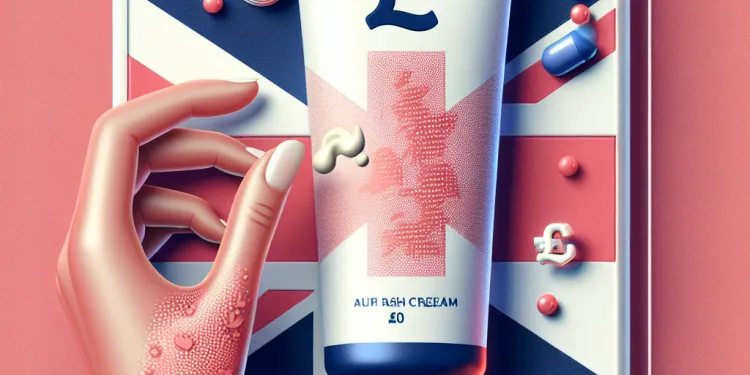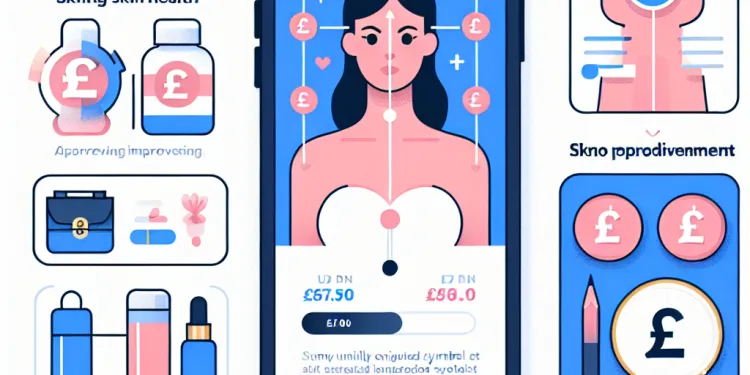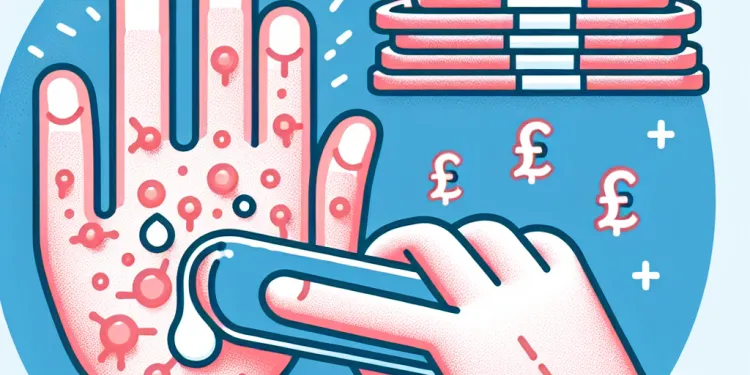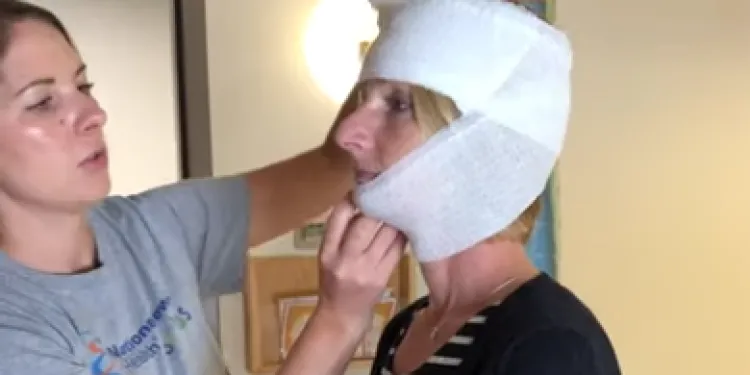
Find Help
More Items From Ergsy search
-

How can I prevent eczema flare-ups?
Relevance: 100%
-

Is eczema contagious?
Relevance: 62%
-

Is there a cure for eczema?
Relevance: 61%
-

Factors that trigger eczema in your child
Relevance: 61%
-

What is eczema? General Information
Relevance: 60%
-

Managing and treating your child's eczema
Relevance: 57%
-

What causes eczema?
Relevance: 56%
-

Can eczema improve with age?
Relevance: 55%
-

What treatments are available for eczema?
Relevance: 55%
-

Who is at risk of developing eczema?
Relevance: 51%
-

Are there any home remedies for eczema?
Relevance: 50%
-

Can diet affect eczema?
Relevance: 50%
-

Eczema - Your child's appointment | Dermatology | Paediatrics
Relevance: 50%
-

What are the main types of eczema?
Relevance: 49%
-

How can eczema be diagnosed?
Relevance: 47%
-

Can stress trigger psoriasis flare-ups?
Relevance: 46%
-

Can dust mites cause asthma and eczema?
Relevance: 43%
-

How does weather affect eczema?
Relevance: 37%
-

What are common symptoms of eczema?
Relevance: 30%
-

How to apply wet wraps
Relevance: 25%
-

How to apply wet wrap bandaging to the head and face area.
Relevance: 20%
-

What is psoriasis?
Relevance: 19%
-

Can hypotony be prevented?
Relevance: 18%
-

Falls Prevention Podcast
Relevance: 18%
-

Can CFS be prevented?
Relevance: 18%
-

Can meningitis be prevented?
Relevance: 18%
-

Can gonorrhoea be prevented?
Relevance: 18%
-

Falls and Falls Prevention
Relevance: 18%
-

Can chickenpox be prevented?
Relevance: 18%
-

Can Rubella be prevented?
Relevance: 18%
-

Can sunburn be prevented?
Relevance: 18%
-

Can shingles be prevented?
Relevance: 18%
-

Is postnatal depression preventable?
Relevance: 18%
-

Can shingles be prevented?
Relevance: 18%
-

Can stress make eczema worse?
Relevance: 18%
-
Are there preventative measures for eating disorders?
Relevance: 17%
-

How can HPV be prevented?
Relevance: 17%
-

How can obesity be prevented?
Relevance: 17%
-

How can HIV be prevented?
Relevance: 17%
-

How can concussions be prevented?
Relevance: 17%
Understanding Eczema Flare-ups
Eczema, also known as atopic dermatitis, is a common skin condition that causes dryness, itching, and inflammation. Flare-ups can be uncomfortable and sometimes painful, but there are steps you can take to prevent them. Understanding what triggers your eczema is key to managing and preventing flare-ups.
Avoid Common Triggers
Identifying and avoiding triggers is essential in preventing eczema flare-ups. Common triggers include specific fabrics like wool or synthetic materials, harsh soaps and detergents, and allergens such as pollen, pet dander, and dust mites. It's advisable to use gentle, hypoallergenic products and to keep your home as free from allergens as possible.
Maintain Good Skin Care Habits
Regular moisturizing is crucial in managing eczema. Use emollients regularly to keep your skin hydrated. Opt for fragrance-free, hypoallergenic moisturizers to minimize irritation. Apply moisturizers immediately after bathing while the skin is still damp to lock in moisture. Keeping your skin moisturized helps maintain the skin barrier and reduces the chance of flare-ups.
Be Mindful of Your Diet
Some people with eczema find that certain foods can trigger outbreaks. Although everyone's triggers are different, common culprits include dairy, eggs, nuts, and shellfish. Keeping a food diary can help you identify and avoid any food-related triggers. In the UK, allergy testing and consultations with a dietitian can offer more personalized advice.
Manage Stress Levels
Stress is known to exacerbate eczema symptoms. Incorporating stress-reducing techniques, such as yoga, meditation, or regular exercise, into your routine can help manage stress levels and prevent flare-ups. Prioritizing mental well-being is an important component of eczema management.
Dress Smartly
Wearing breathable, loose-fitting clothes can reduce the risk of irritation. Cotton and bamboo are good fabric choices. Avoid overheating and sweating in cold weather by layering with soft, breathable fabrics. Always wash new clothing before wearing to remove potential irritants.
Recognize Early Symptoms
Becoming familiar with the early signs of a flare-up can allow for quicker action and potentially prevent severe symptoms. Early treatment with over-the-counter creams or prescribed medications can manage inflammation and provide relief. Consult with your healthcare provider if symptoms worsen or do not improve.
Consult with Healthcare Professionals
In the UK, consulting with a healthcare professional like a GP or dermatologist can provide tailored advice on managing eczema. They can prescribe medications such as topical corticosteroids or other treatments suited to your condition and its severity.
Understanding Eczema Flare-Ups
Eczema is a skin problem that makes your skin dry, itchy, and red. These are called flare-ups. Eczema can hurt, but you can learn how to stop it from getting worse. Knowing what makes your eczema worse can help you control it better.
Avoid Common Triggers
To stop flare-ups, try to avoid things that trigger your eczema. These can be clothes made of wool or synthetic materials, strong soaps, and allergens like pollen, pet hair, and dust. Use gentle soaps and try to keep your house clean.
Maintain Good Skin Care Habits
Keep your skin soft by using creams. Put on a moisturizer often to stop your skin from getting dry. Choose creams that do not have a smell and are gentle on the skin. After a bath or shower, apply moisturizer while your skin is still wet. This keeps your skin moist and less likely to flare up.
Be Mindful of Your Diet
Some foods can trigger your eczema. Foods like dairy, eggs, nuts, and shellfish might cause problems for some people. Keeping a food diary can help find which foods are bad for you. Talking to a doctor or dietitian in the UK can give you more help with this.
Manage Stress Levels
Feeling stressed can make eczema worse. Doing activities like yoga, meditation, or exercise can help you feel less stressed. Take care of your mind, as it is important for handling eczema.
Dress Smartly
Wear clothes that let your skin breathe. Choose materials like cotton and bamboo. When it's cold, wear layers, but make sure each layer is soft and lets your skin breathe. Wash new clothes before you wear them to avoid irritation.
Recognize Early Symptoms
Learn what the early signs of eczema are, so you can start caring for your skin sooner. Over-the-counter creams or medications from your doctor can help. Talk to your doctor if your symptoms get worse or don't get better.
Consult with Healthcare Professionals
In the UK, a doctor or skin specialist can give you advice on managing eczema. They might give you special creams or treatments that are right for your skin problem.
Frequently Asked Questions
What lifestyle changes can help prevent eczema flare-ups?
Avoiding known triggers, managing stress, maintaining a consistent skincare routine, and wearing breathable fabrics can help prevent flare-ups.
Are there specific foods to avoid to prevent eczema flare-ups?
Some people find that avoiding common allergens like dairy, eggs, nuts, and gluten can reduce flare-ups, but this varies by individual.
How important is hydration in preventing eczema flare-ups?
Staying well-hydrated is crucial as it helps maintain skin moisture and barrier function, reducing the risk of flare-ups.
Can using a humidifier help prevent eczema flare-ups?
Yes, using a humidifier can add moisture to the air, which can prevent your skin from drying out and reduce flare-ups.
What role does stress play in eczema flare-ups?
Stress can trigger or worsen eczema flare-ups, so managing stress through techniques like meditation or exercise is beneficial.
How often should I moisturize my skin to prevent eczema?
It's recommended to moisturize at least twice a day, especially after bathing, to keep your skin hydrated and prevent eczema flare-ups.
Are there specific materials I should avoid wearing to prevent eczema?
Avoid wearing wool and synthetic fabrics, as they can irritate the skin. Opt for soft, breathable fabrics like cotton.
How does bathing affect eczema, and what can I do to prevent flare-ups?
Bathe in lukewarm water for no more than 10-15 minutes and avoid harsh soaps. Moisturize immediately after bathing to lock in moisture.
Can certain soaps and detergents cause eczema flare-ups?
Yes, use fragrance-free and hypoallergenic products to reduce irritation and the risk of flare-ups.
Is it important to identify personal eczema triggers?
Identifying your personal triggers is crucial, as avoiding them can significantly reduce the frequency and severity of flare-ups.
What role does weather play in eczema flare-ups?
Extreme weather, both hot and cold, can trigger flare-ups. Protect your skin with appropriate clothing and moisturize regularly.
Can particular skincare products help in preventing eczema?
Use gentle, fragrance-free moisturizers and skincare products to help soothe the skin and prevent flare-ups.
Should I consider using prescription medications to prevent flare-ups?
If recommended by a healthcare provider, topical corticosteroids or other medications may help in managing eczema and preventing flare-ups.
How can I manage itching to prevent eczema from worsening?
Use cool compresses, antihistamines, or prescribed treatments to manage itching and avoid scratching, which can worsen eczema.
Are there any natural remedies for preventing eczema flare-ups?
Natural remedies such as coconut oil or oatmeal baths may help, but it's essential to test them first and consult with a healthcare provider.
What impact does diet have on eczema flare-ups?
Some people find that a diet rich in anti-inflammatory foods, like those high in omega-3 fatty acids, can reduce flare-ups.
How does proper skin care routine help in preventing eczema?
Following a consistent routine of gentle cleansing and regular moisturizing can help maintain the skin barrier and prevent flare-ups.
Can environmental factors in my home contribute to eczema?
Yes, dust, pet dander, and mold can be triggers. Keep your home clean and well-ventilated to reduce flare-ups.
Is there a connection between allergies and eczema flare-ups?
Allergies can exacerbate eczema; managing allergic reactions can help in reducing flare-ups.
How often should I visit a dermatologist for eczema management?
Regular visits, at least once or twice a year, are recommended to manage eczema effectively and adjust treatments as needed.
What can you do to stop eczema from getting worse?
To stop skin problems:
- Stay away from things that make your skin upset.
- Try to stay calm and not stressed.
- Take care of your skin every day with the same routine.
- Wear clothes that let your skin breathe.
What foods should I not eat to stop eczema from getting worse?
If you have eczema, some foods might make it worse.
Here are some foods to be careful with:
- Eggs
- Nuts, like peanuts
- Milk
- Fish
- Soy
- Wheat
Everyone is different, so it's good to watch what you eat. If you think a food makes eczema worse, tell a grown-up or a doctor.
Tools to help:
- Use a food diary to write down what you eat and how your skin feels.
- Ask a doctor or a dietitian for help.
Some foods can make allergies worse for some people. These foods are dairy, eggs, nuts, and gluten. Not everyone has this problem, and it is different for each person.
Why is drinking water important for stopping eczema flare-ups?
Drinking water helps keep your skin healthy and happy. If your skin is dry, eczema can get worse. Make sure to drink plenty of water every day.
Here are some tips to help:
- Set reminders to drink water.
- Use a special cup or bottle that you like.
- Eat foods with lots of water, like fruits and vegetables.
Staying hydrated can help your skin feel better!
Drinking enough water is very important. It helps keep your skin moist and strong. This can stop skin problems from happening.
Can a humidifier help stop eczema from getting worse?
Yes, a humidifier puts water in the air. This helps stop your skin from getting dry. It can also help with skin problems.
How does stress make eczema worse?
Feeling stressed can make eczema worse. But there are ways to help! Doing things like meditation or exercise can help you feel better.
How often should I use lotion to stop dry, itchy skin?
Use lotion every day. It helps your skin stay soft and stops itching.
If you forget, try setting a reminder with a timer or an app.
Ask a friend or family member for help if you need it.
It is good to put on skin lotion twice a day. Do it after a bath. This helps keep your skin soft and stops eczema from getting worse.
What clothes should I not wear to stop eczema?
Do not wear clothes made of wool or fake materials because they can make your skin itchy. Instead, choose clothes made from soft and airy materials like cotton.
How does taking a bath affect eczema, and what can I do to stop it from getting worse?
Bathing and Eczema: Taking a bath can help clean and soothe your skin if you have eczema. But it is important to do it the right way.
Tips for Bathing:
- Use warm water: Make sure the water is warm, not hot, as hot water can dry out your skin.
- Don't stay in too long: Try to keep your baths or showers short, around 5 to 10 minutes.
- Use gentle soap: Pick a mild soap or cleanser that is good for sensitive skin.
- Pat skin dry: After bathing, gently pat your skin dry with a towel, don’t rub.
- Moisturize right after: Put on a moisturizer while your skin is still damp to keep it soft.
Tools and Help: You can use a timer to make sure your bath isn’t too long. Try finding a moisturizer that works well for your skin. If you're not sure, talk to a doctor who can help you find the right products.
Take a bath in warm water for 10 to 15 minutes. Don't use strong soaps. After your bath, use lotion on your skin right away to keep it soft.
Can some soaps make eczema worse?
Yes, use products that don't have a smell and are gentle to stop skin problems and reactions.
Why is it important to know what makes my eczema worse?
It is important to know what things make you feel upset or stressed. If you can stay away from these things, it can help you feel better and stop bad feelings from happening a lot.
How does the weather affect eczema?
The weather can make eczema better or worse.
Cold weather can dry out your skin.
Hot weather can make you sweaty, and sweat can irritate your skin.
Try to keep your skin comfortable.
Use lotion if your skin is dry.
Stay cool if you are hot.
Very hot or very cold weather can make your skin problems worse. Try to wear the right clothes and use skin cream a lot to keep your skin safe and soft.
Can some skincare products stop eczema?
Use gentle creams and lotions with no smell. They help make the skin feel better and stop it from getting worse.
Should I use medicine from the doctor to stop flare-ups?
If your doctor says it's okay, using special creams or medicines on your skin can help take care of eczema. They can stop it from getting worse.
How can I stop itching so my eczema doesn’t get worse?
Here’s how you can help stop the itching: 1. **Keep your skin clean and dry**: Wash gently and pat your skin dry. 2. **Use special creams**: Put on creams made for eczema to stop itching. 3. **Don’t scratch**: Scratching makes it worse. Try tapping or rubbing gently. 4. **Wear soft clothes**: Choose clothes that feel nice and soft on your skin. 5. **Stay cool**: Keep yourself cool, so you don’t sweat too much. 6. **Ask for help**: Talk to a doctor for more ideas. You can also use apps or stories to help you stay calm.Put something cold on your skin, like a damp cloth, to help. You can also use medicine from the pharmacy or medicines your doctor gives you to help with itching. Try not to scratch because it can make your skin problem worse.
Can natural things help stop eczema from getting worse?
Eczema is a skin problem. It can make skin red, dry, and itchy. Here are some simple natural ways that might help:
- Oatmeal Baths: Put some ground oatmeal in the bath. It can help soothe the skin.
- Coconut Oil: Rub a small amount on the skin. It can help keep skin soft.
- Aloe Vera Gel: This can cool and calm the skin.
- Wear Soft Clothes: Choose clothes made from cotton. They can help prevent itching.
- Avoid Skin Triggers: Try to find what makes your eczema worse and avoid it. This can be soap or certain foods.
You can also try some tools to make life easier:
- Calendars and Reminders: Use these to remember when to put on creams or take baths.
- Picture Charts: Make a chart with pictures to show the steps to take care of your skin.
Using things like coconut oil and oatmeal baths might help you feel better. But it's important to try them out carefully first. Also, talk to your doctor to make sure they are safe for you.
How does food affect eczema flare-ups?
Some foods can make eczema worse. This is called a "flare-up."
Try keeping a food diary to see which foods might cause problems.
Avoid foods that seem to make eczema worse.
If you are unsure, talk to a doctor or a nutritionist.
Some foods can help you feel better if you often get painful, swollen areas on your body. Eating foods with omega-3, like fish and nuts, might help stop these flare-ups.
How can taking care of your skin stop eczema?
Eczema is a skin problem that makes your skin itchy and red.
If you take care of your skin every day, it can help stop eczema from happening or getting worse.
Follow these easy steps to keep your skin healthy:
- Use gentle soap and warm water to wash your skin. Hot water can dry your skin.
- Put on moisturizer after washing to keep your skin soft.
- Try not to scratch your skin. It can hurt your skin more.
- Wear soft clothes that don't rub your skin.
Ask a grown-up to help you choose the right products for your skin.
Washing your face softly and using cream every day can help keep your skin healthy and stop problems.
Can things in my home make my eczema worse?
Yes, dust, pet fur, and mold can cause problems. Keep your home clean and airy to feel better.
Do allergies make eczema worse?
People with learning difficulties can understand better with simple words. This version is for an 8-year-old reading level.
Use these helpful tips and tools:
- Pictures can help show what words mean.
- Short sentences are easier to read.
- Your finger can help you follow the words.
Allergies can make eczema worse. Taking care of allergies can help your skin feel better.
How many times should I see a skin doctor for eczema care?
Eczema makes your skin itchy and red. A skin doctor can help. They tell you the best way to care for your skin.
Visit your skin doctor regularly. This could be every few months. Ask them what is best for you.
Your skin might get worse sometimes. If it does, see your skin doctor as soon as you can.
Use tools like reminder apps on a phone to remember your appointments. Bring someone with you, like a family member, for support.
It is good to see the doctor often. Go once or twice every year. This helps look after your eczema and change treatments if needed.
Useful Links
This website offers general information and is not a substitute for professional advice.
Always seek guidance from qualified professionals.
If you have any medical concerns or need urgent help, contact a healthcare professional or emergency services immediately.
Some of this content was generated with AI assistance. We’ve done our best to keep it accurate, helpful, and human-friendly.
- Ergsy carfully checks the information in the videos we provide here.
- Videos shown by Youtube after a video has completed, have NOT been reviewed by ERGSY.
- To view, click the arrow in centre of video.
- Most of the videos you find here will have subtitles and/or closed captions available.
- You may need to turn these on, and choose your preferred language.
- Go to the video you'd like to watch.
- If closed captions (CC) are available, settings will be visible on the bottom right of the video player.
- To turn on Captions, click settings .
- To turn off Captions, click settings again.
More Items From Ergsy search
-

How can I prevent eczema flare-ups?
Relevance: 100%
-

Is eczema contagious?
Relevance: 62%
-

Is there a cure for eczema?
Relevance: 61%
-

Factors that trigger eczema in your child
Relevance: 61%
-

What is eczema? General Information
Relevance: 60%
-

Managing and treating your child's eczema
Relevance: 57%
-

What causes eczema?
Relevance: 56%
-

Can eczema improve with age?
Relevance: 55%
-

What treatments are available for eczema?
Relevance: 55%
-

Who is at risk of developing eczema?
Relevance: 51%
-

Are there any home remedies for eczema?
Relevance: 50%
-

Can diet affect eczema?
Relevance: 50%
-

Eczema - Your child's appointment | Dermatology | Paediatrics
Relevance: 50%
-

What are the main types of eczema?
Relevance: 49%
-

How can eczema be diagnosed?
Relevance: 47%
-

Can stress trigger psoriasis flare-ups?
Relevance: 46%
-

Can dust mites cause asthma and eczema?
Relevance: 43%
-

How does weather affect eczema?
Relevance: 37%
-

What are common symptoms of eczema?
Relevance: 30%
-

How to apply wet wraps
Relevance: 25%
-

How to apply wet wrap bandaging to the head and face area.
Relevance: 20%
-

What is psoriasis?
Relevance: 19%
-

Can hypotony be prevented?
Relevance: 18%
-

Falls Prevention Podcast
Relevance: 18%
-

Can CFS be prevented?
Relevance: 18%
-

Can meningitis be prevented?
Relevance: 18%
-

Can gonorrhoea be prevented?
Relevance: 18%
-

Falls and Falls Prevention
Relevance: 18%
-

Can chickenpox be prevented?
Relevance: 18%
-

Can Rubella be prevented?
Relevance: 18%
-

Can sunburn be prevented?
Relevance: 18%
-

Can shingles be prevented?
Relevance: 18%
-

Is postnatal depression preventable?
Relevance: 18%
-

Can shingles be prevented?
Relevance: 18%
-

Can stress make eczema worse?
Relevance: 18%
-
Are there preventative measures for eating disorders?
Relevance: 17%
-

How can HPV be prevented?
Relevance: 17%
-

How can obesity be prevented?
Relevance: 17%
-

How can HIV be prevented?
Relevance: 17%
-

How can concussions be prevented?
Relevance: 17%


